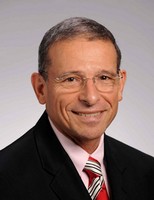Transcripts
 Erik: Joining me now is Russell Napier, who of course is the founder of ERIC – not my name, Erik with a K – but Eric with a C, an acronym for the Electronic Research Interchange. And of course it is a very prominent website for the sale of institutional research to institutional investors.
Erik: Joining me now is Russell Napier, who of course is the founder of ERIC – not my name, Erik with a K – but Eric with a C, an acronym for the Electronic Research Interchange. And of course it is a very prominent website for the sale of institutional research to institutional investors.
Russell, it’s great to have you back on the program.
You know, ever since the 2008 financial crisis, I’ve predicted that eventually this response of encouraging even more borrowing would eventually set us up for another credit crisis in the United States. Well, so far, I’m either very, very early or very, very wrong. And of course in this business, very early equals very wrong.
Is there objective reason – I know that you are much more deeply in touch with the data than I am – to expect another credit crisis either in the United States or elsewhere in the world?
 Erik: Joining me now is Grant Williams, the editor and publisher of Things That Make You Go Hmmm, perhaps one of the best-regarded newsletters in the industry.
Erik: Joining me now is Grant Williams, the editor and publisher of Things That Make You Go Hmmm, perhaps one of the best-regarded newsletters in the industry.
Grant, something that has gotten my attention and I know has yours, and it has the attention of I think the smartest people in the investment industry, is not really just about investments. It’s about using our skills as investors to recognize there’s things going on in the world that are a really big deal. And they have investment implications for sure.
But the social implications, I think, are more important. Give us a quick outline, for those people who don’t read your newsletter, what’s on your mind with respect to civil unrest and the social fabric degradation that’s going on around the world?
 Erik: Joining me now is Katusa Research founder, Marin Katusa.
Erik: Joining me now is Katusa Research founder, Marin Katusa.
Needless to say, the gold market is really, really heating up, folks. And I don’t mind admitting on the air that I was wrong at the end of last year. I really thought we would get down to probably $1,420 or so before eventually this market really took off, which I’ve always expected that it would.
And, sure enough, true to form, gold has broken out of its bull flag formation a lot sooner than I expected it to. And it looks like we’re off to the races.
Marin, let’s start with the big picture on gold and where we stand with gold. What do you see coming? And, particularly, right now we’ve got a lot of geopolitical risk with Iran and everything else going in. Is it possible that this breakout is a false alarm and we really are still headed back down to $1,400 or lower?
 Erik: Joining me now as MacroVoices’ final interview guest for this decade is Dr. Pippa Malmgren.
Erik: Joining me now as MacroVoices’ final interview guest for this decade is Dr. Pippa Malmgren.
Pippa, you have been just on the leading edge of so many things. I think it was two, maybe three, years ago you first started talking about quantum computing. And nobody knew what the hell you were talking about. And of course today it’s one of the hottest stories going. You were really on the leading edge of that.
Now, recently you’ve been paying attention to something called the knowledge-doubling curve. What does that mean?
Pippa: So there is a guy called Buckminster Fuller. He’s the one who invented the geodesic dome.
He was a remarkable scientist who estimated that by the year 1900, the information, the knowledge of the human race was increasing at a rate of about twice every 250 years. In other words, every 250 years you would double the knowledge of the human race.
But by 1900, it was doubling every century. In other words, much faster.
 Erik: Well, folks, last week I promised you for Christmas a good, old-fashioned Art Berman oil special. So crude oil is going to be the topic of the day and, of course, petroleum geologist Art Berman, a very good friend of MacroVoices, is our feature interview guest.
Erik: Well, folks, last week I promised you for Christmas a good, old-fashioned Art Berman oil special. So crude oil is going to be the topic of the day and, of course, petroleum geologist Art Berman, a very good friend of MacroVoices, is our feature interview guest.
As always, Art puts together some of the best slide decks that we have all year long. So, whatever you do, don’t miss downloading Art’s chart deck. The download link is in your Research Roundup email. If you’re not yet registered and don’t have a Research Roundup email, just go to our home page at macrovoices.com, look for the red button that says Looking for the Downloads? next to Art’s picture.
Art, I love the new graphics on the cover slide, but I want to dive right into Slide 2 because this speaks to what I’ve been telling our listeners for a couple weeks now is, in my mind, the core central issue. The IEA has forecast that, even if there is complete compliance with the new deepened OPEC production cuts, even with full compliance, there is still going to be an oil glut in the first half of 2020 that could only mean prices going down dramatically, which is totally opposite of recent market action.
The thing is, Art, that whole forecast is based on IEA’s projection that the US will increase its production by a million barrels a day in 2020. And a lot of that, or most of that, has got to come from the Permian Basin.
MACRO VOICES is presented for informational and entertainment purposes only. The information presented in MACRO VOICES should NOT be construed as investment advice. Always consult a licensed investment professional before making important investment decisions. The opinions expressed on MACRO VOICES are those of the participants. MACRO VOICES, its producers, and hosts Erik Townsend and Patrick Ceresna shall NOT be liable for losses resulting from investment decisions based on information or viewpoints presented on MACRO VOICES.
